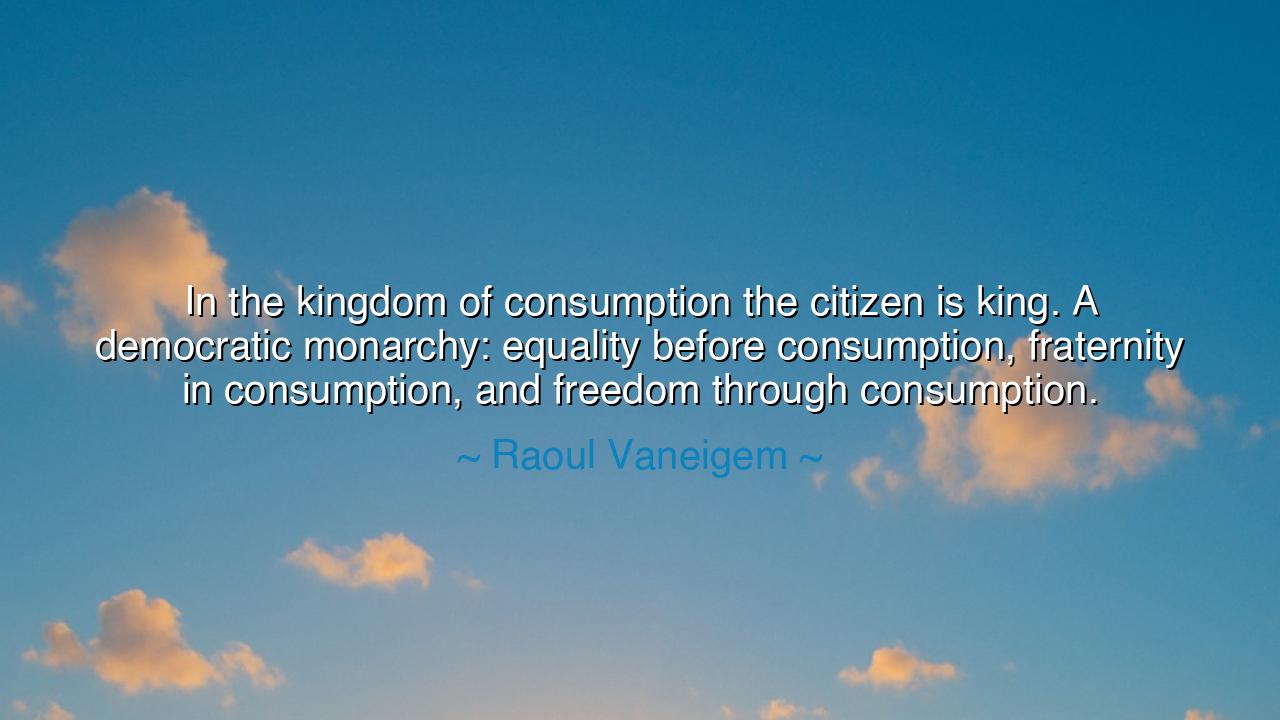
In the kingdom of consumption the citizen is king. A democratic
In the kingdom of consumption the citizen is king. A democratic monarchy: equality before consumption, fraternity in consumption, and freedom through consumption.






Hear, O seeker of wisdom, the words of Raoul Vaneigem, the fiery thinker of the Situationist movement, who proclaimed: “In the kingdom of consumption the citizen is king. A democratic monarchy: equality before consumption, fraternity in consumption, and freedom through consumption.” This utterance, wrapped in irony, unveils the strange paradox of the modern world: that people who once sought dignity through labor, through fellowship, and through struggle are now told they achieve it through the mere act of consuming. He names this realm a kingdom, yet it is a kingdom without soul, where sovereignty is purchased with coins and where every citizen is crowned not by virtue but by appetite.
Mark well the irony of calling it a democratic monarchy. For in truth, democracy was once the rule of the many, bound by shared responsibility and common good. Monarchy was once the rule of the one, clothed in divine right and majesty. But in Vaneigem’s vision, the two fuse into something hollow: all are crowned as kings, yet all wear the same crown of consumption. Equality before consumption means that the rich and poor alike are judged by what they can buy; fraternity in consumption means that we are united not by shared sacrifice but by shared shopping; freedom through consumption means that liberty itself is mistaken for the ability to choose between products.
The origin of this thought arises from the mid-twentieth century, when Europe, scarred by war, saw the rise of mass consumer societies. The Situationists, of whom Vaneigem was a leading voice, warned that modern people were being lulled into passivity by advertising, spectacle, and the marketplace. Where once men and women struggled for justice, they were now told to struggle only for new shoes, new machines, new entertainments. The dream of liberty, equality, and fraternity—born in the French Revolution—was being transformed into a parody: consumption in place of citizenship.
History itself reveals this shift. Recall the mighty Roman Empire. In its earliest days, Rome was bound together by discipline, virtue, and the labor of its citizens. But as wealth flooded into the empire, the cry of the people was no longer for justice or duty, but for “bread and circuses.” Entertainment and consumption replaced civic virtue, and the people, though they felt themselves kings, were in truth subjects of a decaying order. Vaneigem’s warning echoes this lesson: when consumption becomes the crown, the kingdom is already in decline.
Yet there is also a hidden heroism in this recognition. To see the illusion is the first step toward freedom. If one understands that consumption cannot satisfy the deepest needs of the soul, one begins to seek truer forms of equality, fraternity, and freedom. Equality not in the shopping mall, but in dignity; fraternity not in buying together, but in building together; freedom not in choosing brands, but in shaping one’s destiny. Vaneigem’s words, though cloaked in cynicism, are a call to awaken from the dream of consumption and reclaim the true kingdom of human community.
O children of tomorrow, take heed: the marketplace will call you kings, but it will also bind you with chains of desire. Do not mistake the crown of consumption for true sovereignty. The possessions you own can never equal the life you live, the love you give, or the freedom you defend. To live only as a consumer is to live as a shadow; to live as a creator, a neighbor, a builder of justice—that is the life of true majesty.
What then must you do? Break free from the kingdom of consumption. Let your worth not be measured by what you own, but by who you are. Resist the lie that liberty lies in endless buying. Seek instead to create, to share, to labor for the common good. Build relationships stronger than possessions, communities richer than markets, and a freedom deeper than choice between products. For only then will you rise as true kings and queens—not in the hollow monarchy of consumption, but in the living kingdom of humanity, bound together by justice, love, and truth.
Thus, Vaneigem’s words remain a mirror and a warning. They show us what we have become in the age of spectacle, and they summon us to seek more. Let his lesson endure: consumption may crown us kings, but only creativity, justice, and compassion can make us free.






AAdministratorAdministrator
Welcome, honored guests. Please leave a comment, we will respond soon